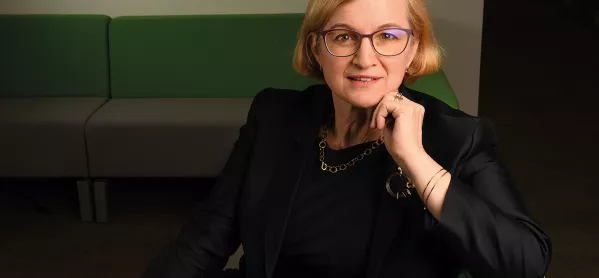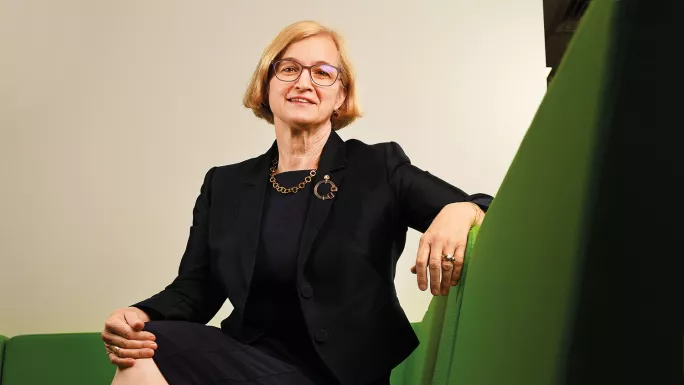
- Home
- Amanda Spielman profile: ‘I don’t want to become a workload problem’
Amanda Spielman profile: ‘I don’t want to become a workload problem’

“I’m not going to express every view I’ve ever had on day one,” Amanda Spielman says. She pauses. “Or even day five.”
It is already clear, five days into her new job as chief inspector of Ofsted, that Spielman’s style will be very different from that of her predecessor, Sir Michael Wilshaw.
“I have to be very careful in random expression of my views,” she tells TES.
“This is not about retreating and saying we will simply publish some reports on a website and nothing else. But, equally, I’m not approaching it as the job being simply a platform for me to say whatever I’m thinking about the education system.”
Spielman took over from Sir Michael at the start of this month. Speaking to TES in her office at Ofsted’s headquarters in Holborn, central London, she admits that she is still settling in: she knows where the kitchen is now. (“She’s probably the first chief inspector to use the kitchen,” one of her colleagues says.) But she fiddles with the various extension leads in the centre of the meeting table: “Not sure what these do.”
Spielman comes to Ofsted from Ofqual, where she was chair. She acknowledges that working for an exams regulator is not necessarily everyone’s idea of fun: when she accepted the Ofqual post, friends’ reactions were split between, “That’s going to be amazingly boring,” and, “You’re completely mad - it’ll be a nightmare.”
“A lot of people think of regulating and inspecting as dry, dull stuff,” she says. “For me, it’s not. For me, it’s endlessly interesting.”
And how did these same friends respond when she took the Ofsted job? Spielman laughs. “Most people’s reaction is something along the lines of, ‘Well, that’s half congratulations and half commiserations.’”
A turbulent start
The commiserations were not misplaced: Spielman’s appointment to the role was turbulent. She was initially rejected by cross-party MPs in the Commons Education Select Committee, who said that she lacked the “passion and vision” for the role. Her appointment was eventually pushed through by former education secretary Nicky Morgan.
Spielman pauses. “I can say that going through a political appointment process in a period of maximum political turbulence is an interesting one. It was a little more exciting than I would have chosen but, well, I’m here.”
But she insists that she is not worried that the one politician who championed her appointment is no longer working in education.
“You should never be the client or mate of any minister,” she says. “One of the challenges is that, as soon as you are appointed, you then have to exercise the independence that goes with that role. The proof is very much in the pudding: I have to do the job and do it well.”
She sees the role as aggregating the evidence and then looking at the messages that emerge. For many schools, however, there is a sense that Ofsted is already too data-driven; the fear is that inspections will become so data-based that school visits will eventually be phased out altogether.
“No, I don’t think so,” Spielman says. “Precisely because I have good insight into data, I have really good insight into its limitations. A lot of the value that Ofsted adds is because expert inspectors complement system data. So I would never want to collapse the thinking into saying that data does everything. It’s because it never can that Ofsted is valuable.”
Passion for education
Spielman’s career in education began relatively late. She was almost 40 when she realised that she was bored with her City finance job. So she started to think about what interested her the most. “And I just realised that I’d always read everything that I’d ever come across about education, since I was at primary school myself, actually.
“So I thought, ‘Ooh. Duh! It’s education you’re interested in. Why on earth aren’t you doing something about it?’”
She quit her job and began a postgraduate degree in comparative education at the UCL Institute of Education. By the end of the course, she realised that education was the only area that she wanted to work in.

Spielman joined the Ark academy chain in its earliest days and worked there for seven years before moving to Ofqual. She retains the same enthusiasm for education that she had back then.
“It’s a lovely combination of the human and the intellectual - it’s big, it’s complicated, but above all it has such profound implications for people’s lives,” she says.
“Education has that universality: everybody needs an education, to make the most of themselves and their lives, and for us to make the most of civilisation. Education is the great force of human advancement, of the advancement of civilisation.
“So, to be able to work my way into being a part of the whole national development of education in this country - I can’t imagine wanting to do anything else right now. It’s a fantastic opportunity. I’ve been walking around with a big smile - ever since I first started coming into this building, I feel as if I’ve been coming in with a big smile on my face every time.”
‘I want to listen’
She has said that she wants to listen to heads and teachers: for Ofsted to be a learning organisation. The risk, of course, is that she ends up working closely with a headteacher who then receives a bad inspection report.
She is, however, sanguine about this possibility. “I never expected this to be the most comfortable job in the world. It’s not a popularity contest. I’ve got to make sure that Ofsted continues to deserve and earn respect - which is not the same as being popular.
“I’m not expecting people to like Ofsted, but I’m expecting them to see it as something that is fundamentally a constructive force in the system - an organisation whose involvement is to be welcomed, overall.”
But this insistence on listening to teachers and being driven by the data does mean that she is unwilling to say anything without the evidence to back up her statement. Asked whether she thinks that pupils today are overtested, she says: “If you’d been interviewing me a few weeks ago, with an Ofqual hat on, I’d be a lot more forthcoming than I’m probably going to be today, with an Ofsted hat on, because I don’t think we have a particular Ofsted view.”
At times, in fact, she is so circumspect that she appears to be reading from a script. “What do I think of grammar schools?” she says to TES. “It is for ministers to make policy. For me, here, I see them as being largely a distraction from our job of helping to make sure that schools are as good as they can possibly be.”
Compare what she said to The Guardian, when questioned about grammar schools: “For me, it’s a distraction from our work.”
What do you most want to achieve in this role, TES asks. “I’d like to get to a place where nobody can remember a time when they didn’t think of Ofsted as a force for improvement. I’d like that to be a dim and distant memory.”
And on the same subject in The Guardian: “I want to get to a point where people just can’t imagine not seeing Ofsted as a force for improvement in any of its remits.”
Spielman has said that she “will not be dull” as chief inspector. But by this she meant that the evidence available will reveal interesting things; the risk of expressing opinions that are not evidence-based is too great, she believes.
“I have to be extremely careful about what I say, because there is a sort of magnification effect. If I say, ‘Ofsted is concerned about this,’ I don’t want to accidentally trigger 20,000 people in 20,000 schools being told to go and put together a plan for this, or collect evidence to prove that this has been done. I could become a workload problem, rather than part of a force for improvement.”
This was originally published in Tes magazine on 13 January 2017
Want to keep up with the latest education news and opinion? Follow Tes on Twitter and like Tes on Facebook
Register with Tes and you can read five free articles every month, plus you'll have access to our range of award-winning newsletters.
Keep reading for just £4.90 per month
You've reached your limit of free articles this month. Subscribe for £4.90 per month for three months and get:
- Unlimited access to all Tes magazine content
- Exclusive subscriber-only stories
- Award-winning email newsletters
You've reached your limit of free articles this month. Subscribe for £4.90 per month for three months and get:
- Unlimited access to all Tes magazine content
- Exclusive subscriber-only stories
- Award-winning email newsletters



